Public Health Degree Programs in Illinois
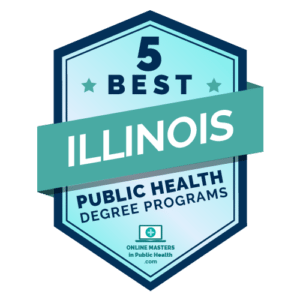 Illinois is the 6th most populous state in America and the 25th largest in terms of physical area. The state is reflective of America’s economic and communal diversity, featuring a premier city in Chicago, large agricultural productivity, significant natural resources and a major transportation hub connecting the ends of the country through the center. It is also a great place to earn a Public Health degree.
Illinois is the 6th most populous state in America and the 25th largest in terms of physical area. The state is reflective of America’s economic and communal diversity, featuring a premier city in Chicago, large agricultural productivity, significant natural resources and a major transportation hub connecting the ends of the country through the center. It is also a great place to earn a Public Health degree.
According to U.S. News & World Report, Illinois ranks 21st in healthcare access, 37th in healthcare quality, and 20th in public health. Clearly, there’s a lot of work to be done in the state. Because of its large population and its physical location, Illinois has unique public health concerns that desperately need addressing.
Every year researchers at the University of Wisconsin’s Population Health Institute put out the County Health Rankings to look at life expectancy and the health of residents across the state.
Julie Willems Van Dijk, a director of the organization, explains that the reason they do it is to raise awareness about how healthy communities are, and what health challenges they are facing. They strive to do so in a way that piques people’s interest by comparing their health issues to other counties in their community. This method helps everybody see that health in their community is not just about their health system and what the doctors and nurses do. It is about decisions made by businesses, the government, and people of the community.
Some of the largest public health problems in Illinois include:
- Access to care (i.e. ability to physically and financially obtain crucial medical services or treatments)
- Food Sanitation
- Substance Abuse
- Public Health Infrastructure
- Disparities in Cancer Rates
Some of the things you could work on as a public health professional in Illinois include:
- Tobacco use prevention
- Food Inspection
- HIV Prevention
- Obesity Prevention
- Adolescent Health
- Expanding Access to Care
- Violence Prevention
Income inequality, systemically racist policing, drug epidemics, and easy access to guns have all decimated areas of Illinois taking its toll on both family and community. Its problems are specific, yet also reflective of our countries’ brutal economic and racial segregation. You can be part of fighting against these harsh realities by working in the public health field. Fortunately, Illinois is home to some of the top schools for educating public health professionals in the country. We’ve ranked five of the best public health degree programs in Illinois using the following methodology:
Illinois Public Health Degree Program Methodology
In building the ranking for The 5 Best Public Health Degree Programs in Illinois, we here at OnlineMastersinPublicHealth looked through all of the undergraduate programs with a major in public health, MPH programs, and doctoral programs available in the state of Illinois. Programs featured may be traditional programs which are on-campus or online degrees. We then followed a standard methodology which is explained below in order to bring you these featured programs.
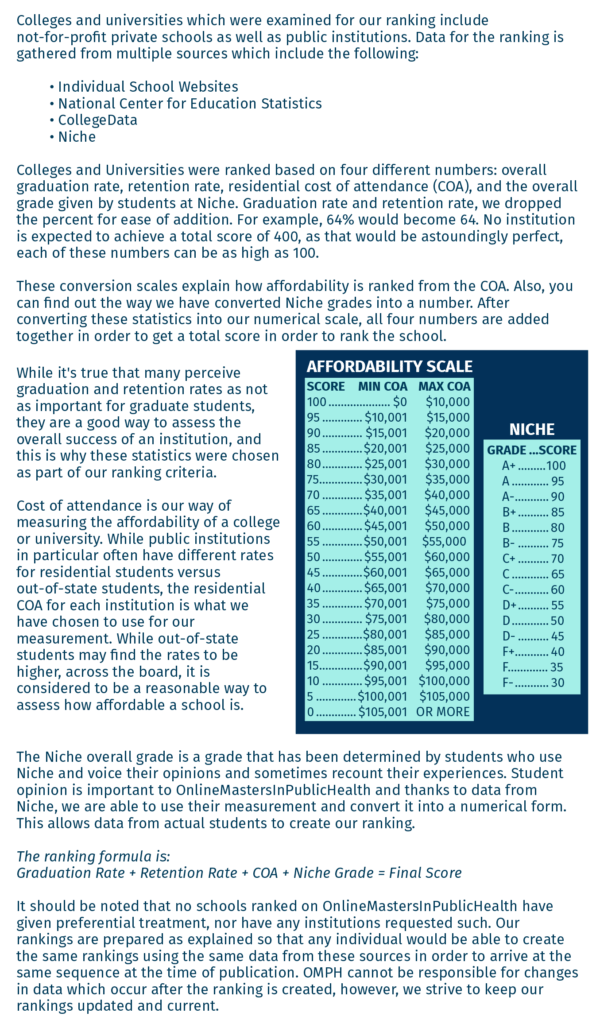
The 5 Best Public Health Degree Programs in Illinois:
1. University of Illinois at Urbana-Champaign
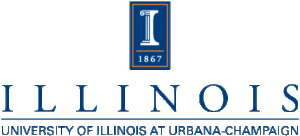 The University of Illinois is a public research university and the flagship school of the University of Illinois system. It was founded in 1867, and its flagship campus is divided between the twin cities of Champaign and Urbana. The system is comprised of 16 schools and colleges, which offer over 150 undergraduate and over 100 graduate programs. USNR has ranked it 52nd among national universities, and it has been ranked 36th by the Times Higher Education World University Rankings. Nearly 47,000 students attend Illinois, which has a 20:1 student-to-faculty ratio. The Illinois Fighting Illini field ten men’s and eleven women’s varsity sports in the NCAA Divison I. Urbana-Champaign’s in-state tuition and fees for graduate students in 2017-18 is $18,224, and out-of-state tuition and fees add up to $31,811. Urbana-Champaign’s illustrious alumni include 22 Pulitzer Prize winners.
The University of Illinois is a public research university and the flagship school of the University of Illinois system. It was founded in 1867, and its flagship campus is divided between the twin cities of Champaign and Urbana. The system is comprised of 16 schools and colleges, which offer over 150 undergraduate and over 100 graduate programs. USNR has ranked it 52nd among national universities, and it has been ranked 36th by the Times Higher Education World University Rankings. Nearly 47,000 students attend Illinois, which has a 20:1 student-to-faculty ratio. The Illinois Fighting Illini field ten men’s and eleven women’s varsity sports in the NCAA Divison I. Urbana-Champaign’s in-state tuition and fees for graduate students in 2017-18 is $18,224, and out-of-state tuition and fees add up to $31,811. Urbana-Champaign’s illustrious alumni include 22 Pulitzer Prize winners.
Urbana-Champaign offers several programs in public health. One great option is its BS/MPH joint program, in which students can complete their Bachelor’s and Master’s in public health in 5 years. Students enter this accelerated program through undergraduate study in I-Health, Kinesiology, and Community Health, then apply as they progress through their studies for the joint program. Urbana-Champaign also offers a traditional, two-year MPH, and 4-year programs that combine MPH and MBA degrees, or MPH and MUP (Master’s in Urban Planning programs. These are traditional, on-campus programs. The University of Illinois system also offers several online certificates, including Health Disparities Research, Public Health Geographic Information Systems, and Health Communication. With a system as big as U of I, there’s always the potential for new public health offerings, especially online, so make sure to keep tabs on its course offerings if you feel it’s a good fit for you.
You can find the Urbana-Champaign public health degree webpage here. Prospective students can contact the school if you would like to request information for more details.
2. Northwestern University
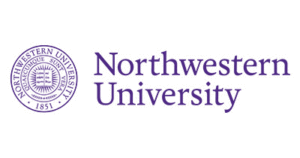 Northwestern University is a private, research university in Evanston Illinois. Northwestern has twelve schools and colleges that supply 124 undergraduate degrees and 145 graduate/professional degrees. It was founded in 1851. Northwestern has an extremely large university endowment compared to American universities, with a current value of over $10 billion. Over 50 startup companies have been founded based on technologies created and developed at Northwestern. Over 21,800 students attend Northwestern, which has a 7:1 student-to-faculty ratio. Full-time graduate tuition and fees at Northwestern in 2017-18 comes to $52,679. Northwestern has 19 intercollegiate athletic teams competing in NCAA Divison I (8 men’s and 11 women’s). Notable alumni include actors Charlton Heston and Zooey Deschanel, Supreme Court Justice John Paul Stevens, and many others.
Northwestern University is a private, research university in Evanston Illinois. Northwestern has twelve schools and colleges that supply 124 undergraduate degrees and 145 graduate/professional degrees. It was founded in 1851. Northwestern has an extremely large university endowment compared to American universities, with a current value of over $10 billion. Over 50 startup companies have been founded based on technologies created and developed at Northwestern. Over 21,800 students attend Northwestern, which has a 7:1 student-to-faculty ratio. Full-time graduate tuition and fees at Northwestern in 2017-18 comes to $52,679. Northwestern has 19 intercollegiate athletic teams competing in NCAA Divison I (8 men’s and 11 women’s). Notable alumni include actors Charlton Heston and Zooey Deschanel, Supreme Court Justice John Paul Stevens, and many others.
Northwestern offers a program in Public Health through its Feinberg School of Medicine. The program touts a multidisciplinary educational environment that will give graduate students the training they need to fill professional roles in public health, clinical care, and health research. In this program, you’ll be alongside top-notch peers and build powerful relationships with faculty leaders in public health. Another great option is Northwestern’s M.S. in Biostatistics, which comes with flexible curriculum options aimed at fulfilling individual needs of students. This program builds skills in the latest data analysis and computational techniques. Finally, the school boasts an MD/MPH program that can be completed in four years by studying their MD curriculum in the day and their MPH programming in the evening (not for the faint of heart).
You can find the Northwestern University public health degree webpage here. Prospective students can contact the school if you would like to request info for more details.
3. University of Illinois Springfield
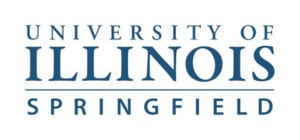 UIS is a public university that was established in 1969, in Springfield, Illinois. It has over 5,400 students and a 15:1 student-to-faculty ratio. UIS offers access to 27 undergraduate degree programs, 20 master’s degree programs, and a doctorate in Public Administration. Springfield regionally renowned school that has attained equal if not more acclaim for its online offerings. In the 2014 US News “Best Colleges” rankings, UIS ranked #8 in Top Public Schools (Midwest region) and #36 in Regional Universities (Midwest). Their online programming began in 1999, and frequently wins awards and distinctions. Since 2001, the Sloan Consortium has offered an award for “Most Outstanding Achievement by an Individual in Online Learning. In 2002, 2003 and 2006 UIS professors won that award. UIS also ranked 11th among online universities in the U.S. on Guide to Online Schools’ 2013 Online College Rankings. UIS athletic teams are called the Prairie Stars and compete in the NCAA Division II. There are 9 women’s sports, and seven men’s offered by UIS. Notable alumni include former White House Press Secretary Dana Perino, Jim Langfelder, the mayor of Springfield, and movie producer Russell Smith. Graduate in-state tuition for Springfield in 2017-18 is $11,308, and out-of-state tuition is $18,093.
UIS is a public university that was established in 1969, in Springfield, Illinois. It has over 5,400 students and a 15:1 student-to-faculty ratio. UIS offers access to 27 undergraduate degree programs, 20 master’s degree programs, and a doctorate in Public Administration. Springfield regionally renowned school that has attained equal if not more acclaim for its online offerings. In the 2014 US News “Best Colleges” rankings, UIS ranked #8 in Top Public Schools (Midwest region) and #36 in Regional Universities (Midwest). Their online programming began in 1999, and frequently wins awards and distinctions. Since 2001, the Sloan Consortium has offered an award for “Most Outstanding Achievement by an Individual in Online Learning. In 2002, 2003 and 2006 UIS professors won that award. UIS also ranked 11th among online universities in the U.S. on Guide to Online Schools’ 2013 Online College Rankings. UIS athletic teams are called the Prairie Stars and compete in the NCAA Division II. There are 9 women’s sports, and seven men’s offered by UIS. Notable alumni include former White House Press Secretary Dana Perino, Jim Langfelder, the mayor of Springfield, and movie producer Russell Smith. Graduate in-state tuition for Springfield in 2017-18 is $11,308, and out-of-state tuition is $18,093.
UIS offers an online Master’s of Public Health (MPH), a rarity in the region. It will train graduate students to work on behalf of individuals, organizations, and communities to advance public health in myriad ways. The program covers disease control and prevention, healthcare access, environmental protection, special populations, data analysis/evaluation, policy planning and administration, health promotion, and more. This program has been commended multiple times for affordability and excellence. It promotes, distributes research on a local, national and global level, and will prepare students for careers working as inspectors, policy advisors, journalists, international HIV specialists, analysts, and much more. Even online, students will find themselves working closely with health educators and must complete an internship through this program. A unique feature of the program asks students to choose one course from umbrella topics like Emerging Issues, Advanced Epidemiology, Analytical Tools, and Social Determinants (as opposed to specializing in just one of these areas).
You can find the UIS public health degree webpage here. Prospective students can contact the school if you would like to request information for more details.
4. Loyola University Chicago
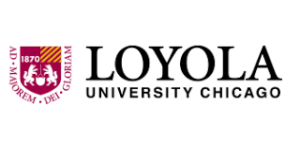 Loyola University Chicago is a private American Catholic research university. It was founded in 1870 by the Jesuits and is one of the biggest Catholic universities in the nation. Loyola conveys over 80 undergraduate and 140 graduate or professional programs through eleven colleges and schools. Over 16,400 students attend LUC, and it offers students an improbable 14:1 student-to-faculty ratio. In 2017, LUC was ranked in the top 100 National Universities by USNR. USA Today and Washington Monthly have also cited LUC as a college committed to community service. Loyola’s athletics teams are known as the Ramblers, and offer six men’s and seven women’s sports in NCAA Division I. Notable alumni include child prodigy Sho Yano, the Smashing Pumpkin’s James Iha, singer Karla DeVito and a host of congressional representatives. In 2017-18, graduate tuition and fees for Loyola come to $19,458.
Loyola University Chicago is a private American Catholic research university. It was founded in 1870 by the Jesuits and is one of the biggest Catholic universities in the nation. Loyola conveys over 80 undergraduate and 140 graduate or professional programs through eleven colleges and schools. Over 16,400 students attend LUC, and it offers students an improbable 14:1 student-to-faculty ratio. In 2017, LUC was ranked in the top 100 National Universities by USNR. USA Today and Washington Monthly have also cited LUC as a college committed to community service. Loyola’s athletics teams are known as the Ramblers, and offer six men’s and seven women’s sports in NCAA Division I. Notable alumni include child prodigy Sho Yano, the Smashing Pumpkin’s James Iha, singer Karla DeVito and a host of congressional representatives. In 2017-18, graduate tuition and fees for Loyola come to $19,458.
Loyola offers a Master of Public Health (MPH) that comes in two tracks. The Health Policy & Management track can be completed entirely online, a regional treat. The Epidemiology track is a hybrid program of online & in-person evening courses. Both programs require a practicum training experience, a capstone project, and 44 credits. The school also offers a public health certificate program. The program specifically grapples with racial and economic health inequalities, and how they can be combatted with public health research, practice, and advocacy. Loyola’s public health programs are a combined effort of its schools of Medicine, Bioethics and Health Policy, Environmental Sustainability, Social Work, Nursing, and Law.
You can find the Loyola University Chicago public health degree webpage here. Prospective students can contact the school if you would like to request info for more details.
5. University of Illinois at Chicago
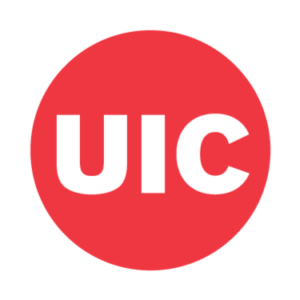 UIC is a public research university in Chicago. It was founded in 1965. Over 29,100 students attend UIC, which boasts an 18:1 student-to-faculty ratio. The school is very influential in the region. Approximately one in ten Chicagoans with a college degree are an alumnus of UIC, and one in eight Illinois doctors graduated from the UIC College of Medicine. In 2017-18, the average graduate tuition and fees at UIC come to $16,622 for in-state students, and for out-of-staters, it’s $26,862. UIC boasts 83 Bachelor’s, 93 Master’s, and 64 Doctoral degrees through 15 colleges. The UIC Flames compete in NCAA Division I, offering 20 varsity sports (9 for men and 11 for women). USNR ranked UIC 174th in the world in 2017. Notable alumni include revolutionary activist Bill Ayers, architect and artist Jimenez Lai, the longtime partner of Oprah Winfrey and management/public speaking specialist Stedman Graham, and many others.
UIC is a public research university in Chicago. It was founded in 1965. Over 29,100 students attend UIC, which boasts an 18:1 student-to-faculty ratio. The school is very influential in the region. Approximately one in ten Chicagoans with a college degree are an alumnus of UIC, and one in eight Illinois doctors graduated from the UIC College of Medicine. In 2017-18, the average graduate tuition and fees at UIC come to $16,622 for in-state students, and for out-of-staters, it’s $26,862. UIC boasts 83 Bachelor’s, 93 Master’s, and 64 Doctoral degrees through 15 colleges. The UIC Flames compete in NCAA Division I, offering 20 varsity sports (9 for men and 11 for women). USNR ranked UIC 174th in the world in 2017. Notable alumni include revolutionary activist Bill Ayers, architect and artist Jimenez Lai, the longtime partner of Oprah Winfrey and management/public speaking specialist Stedman Graham, and many others.
UIC’s public health degree offerings are the most varied on the list and allow students of all education levels to break into the field, and potentially work towards earning a terminal degree within it. They begin with a Pre-Public Health program that is intended for people with student experience and are mid-way through completing their Bachelor’s. Also, they must have completed some prerequisite work. They then apply for this program with Junior status, and choose between the “professional track (designed for those students who intend to enter the professional workforce upon completion of the BA) or the academic track (designed for those students who intend to pursue further academic degrees upon completion of the BA).” There’s also a traditional bachelor’s program with a major in public health that students can begin with the intention of earning a Public Health B.A. UIC then moves forward into graduate and doctoral level degrees in public health, for prospective graduate students with suggested undergraduate study in public health or a related field. Qualified students are able to earn an MS in Public Health. Finally, students can opt to earn their DrPH from UIC, with the next deadline to apply on February 1st, 2018.
You can find the UIC public health degree webpage here. Prospective students can contact the school if you would like to request information for more details.
Illinois Public Health Degree Programs – In Conclusion
Before limiting your education for public health to only programs in Illinois, take a look at some of the top MPH programs in the country. You can find them in our Top 25 Online MPH Programs ranking.
Here’s a sneak peek:
- 1. University of Florida
- 2. University of North Carolina at Chapel Hill
- 3. University of California, Berkeley
- 4. Purdue University
- 5. Indiana University Bloomington
- 6. University of Massachusetts Amherst
- 7. University of South Florida
- 8. University of South Carolina
- 9. George Mason University
- 10. San Diego State University
You might also want to check out our rankings on online Biostatistics MPH degree programs. We’ve also ranked the online Bachelor’s in Public Health Degree Programs, and Online Master’s Degree in Health Administration programs.
If you are interested to learn more about careers in public health you can check out our featured list of health careers at 50 Top Public Health Jobs.